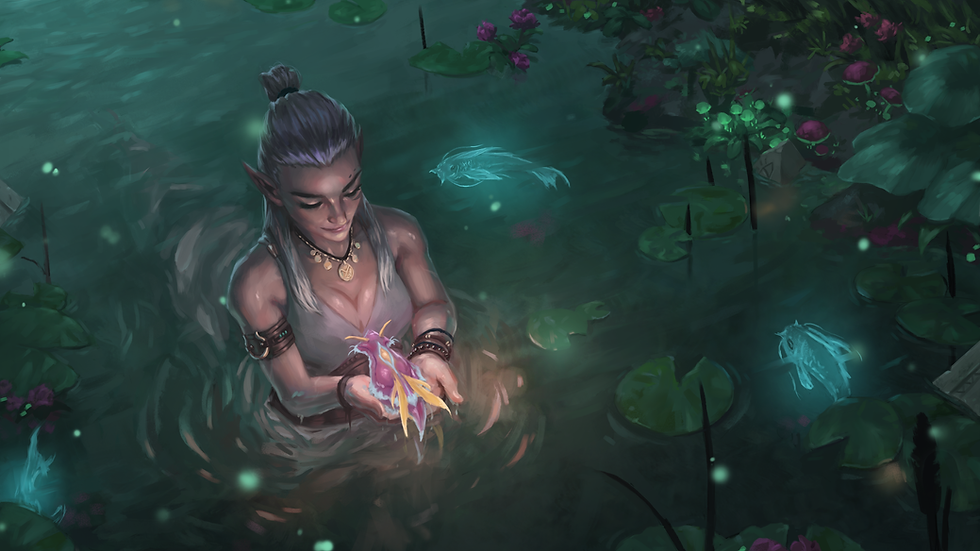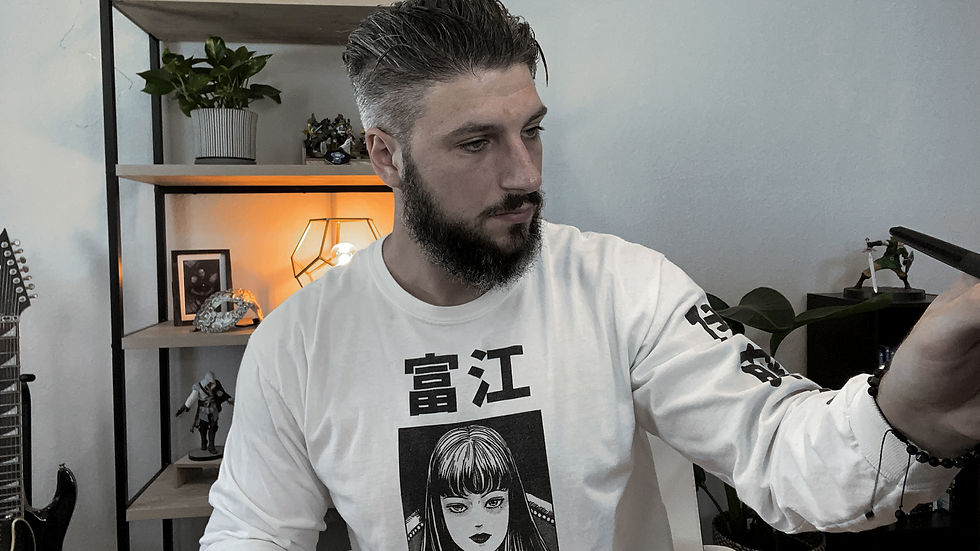How To Get a Job As a Concept Artist or Illustrator
- Dec 1, 2022
- 5 min read
Stuck in a boring office job or finishing up art school and don't know what's next? I'm here to help set you on a path to success with your Art Career!

I have been a professional concept artist and illustrator for the past decade, and have worked for numerous clients including Disney, Fantasy Flight Games, and Dungeons & Dragons. I've worked on any type of gig you can imagine, including video games, films, and card art. Below I will share with you the 5 things you need to do to prepare and start getting paid work as an artist.
If you want to dive right into the more technical side and accelerate your artistic growth, network, and income I also offer a course called Launch Your Art Career, where I go more into securing work, growing your social media following, and creating your own products or side hustles!
Either way, let's begin!
Me in my office busy at work!

1) Learn Your Fundamentals, and Improve Your Skills
This may sound obvious, but the first step to getting work as a professional concept artist or illustrator is to begin by honing your skills. When I was in college, I found myself stuck with trying to figure out how to get over my plateau. 2 things really helped -- Studies and feedback from other artists (preferably ones who have experience already!).
Studies are a great way to begin understanding WHY things work the way they do. I'd suggest trying your best to do a study a day, and varying up what you're studying. For example, if you're looking to be more of a character artist, one day focus on anatomy, and then the next day on armor design. You want to make sure you are covering ALL of your fundamentals with studies, and not getting caught up too deeply with one. I am more of a fan of trying to level up equally between form, color, perspective etc. This is going to give you the best edge towards having consistent work!
The next thing to do is to find other more experienced artists online, or at events, and just pick their brain! A great way to learn is by having a second set of eyes look at your pieces, and having them critique your work. Because you've been staring at a piece for so long, many times you'll find that someone will see something you've totally missed! With a more experienced artist, you may get feedback about a new technique or fundamental that you've never thought to implement before.
--As a side note, when asking for critique, it's always helpful to be specific about what you'd like feedback for, and also to thank them for their time!
Below is an example of a study I did to train my eye with limited values. This helped me not only understand form better, but I also learned a bit about anatomy with this one as well!

2) Create a Solid Portfolio
Creating a portfolio that makes someone go "WOW" is the next step. Make sure your work is consistent! Someone should be able to briefly take a look at your work, and immediately understand what makes your art YOU. This is easier said than done, but here are a few things to consider--
Create your go-to portfolio site. I'd personally suggest either ArtStation or a personal website. I think ArtStation has a very clean look, and feels very professional. It's also a place where you can begin growing a following, connect with other artists, and search for jobs.
Figure out what you really love to do. Is it dragons, environments, bunnies??? It doesn't even necessarily need to be a subject but a mood. Maybe you are really into gothic horror looking art, and your whole portfolio revolves around that!
Make sure you have 5-10 of your BEST pieces in your portfolio. As the old saying goes, "Your worst piece is your best piece". You really want to make sure that when a potential employer visits your portfolio, they can expect what they hire you to do to look like what's in your portfolio.
Presentation is key! Make sure your images don't have any weird crops, or look blatantly unfinished. If you are presenting concept art, consider utilizing text or graphical elements to help sell the presentation. It's helpful to look at "Art Of" books to see how other professional work can possibly be displayed!
Here are some pieces in my portfolio that have helped me land other gigs. Some pieces were for clients, while others were personal works.
3) Post Your Work Online
While your portfolio should be the place to present your best work, posting on Instagram, Discord, Reddit, and other online platforms is the way to stay up-to-date in people's minds.
When you are first starting out with social media posting it can seem a bit daunting, but sticking with it is well worth it! The majority of the gigs I've gotten haven't been from applying, but rather just being consistently visible online and having people reach out to me for work. When you set up your accounts, make it obvious that "commissions or Dms are open", to make it more inviting for people to reach out to you.
The most important part of social media is posting consistently, and frequently. Don't be worried about posting Works In Progress! Sometimes people like seeing sketches, or behind-the-scenes elements to your work. Also note that right now, video content is king -- so however you can think to translate your art into video is going to be the most beneficial way of posting at the moment.
Post consistent, engaging pieces for your best chance of someone reaching out to you for work!

4) Exhaust All Your Possibilities Searching For Work
While I think ArtStation is probably the premiere platform for searching for work, think outside the box with this one! Most people's instinct when looking for work is to do general google searches, or going on sites like Indeed. While you will find job listings on those sites, there are more opportunities than just full time studio work!
I've personally found a lot of work on freelance sites like Upwork (Fiverr not so much). What's great about Upwork is that you can bid for jobs. If you have a great portfolio that stands out and you can write a solid intro message, then you're more likely to secure work! Don't neglect other resources such as Discord servers and Facebook groups. There are plenty of servers (like my own Art broZ server!) which host a "Need Work" channel. Discord is a great place to also network with other artists. I'm also a part of some game develop Facebook groups which also frequently post job listings. You can even get super out of the box with it, and start looking at some companies that have recently been Kickstarter funded, and seeing if they need any help with art!
5) Don't Forget to DM and Follow Up!
This is a crucial part of the process that many people seem to neglect. The final step after applying to gigs is to find someone to follow up with directly. I personally think that finding recruiters, hiring manager, or art directors on LinkedIn is the best way to approach this. An easy way to connect is to send a brief message stating something like this,
"Hey ____, I wanted to reach out, connect, and let you know I applied for ____ position at your studio. I'm happy to answer any questions you may have about me or my work. Thanks!"
Being friendly, short, sweet, and to-the-point is very advantageous for growing your connections. While this may not land you the job every time, it's a great way to stand out to people. The more people you can make a connection with, the more likely your possibilities for work are!
Until next time!
-Nik Hagialas
Pursue art full-time with my course below!


















Comments